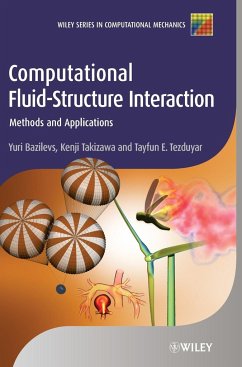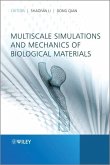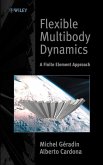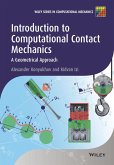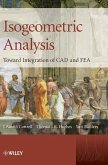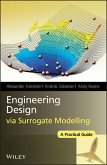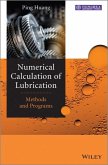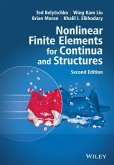Yuri Bazilevs, Kenji Takizawa, Tayfun E. Tezduyar
Computational Fluid-Structure Interaction
Methods and Applications
Yuri Bazilevs, Kenji Takizawa, Tayfun E. Tezduyar
Computational Fluid-Structure Interaction
Methods and Applications
- Gebundenes Buch
- Merkliste
- Auf die Merkliste
- Bewerten Bewerten
- Teilen
- Produkt teilen
- Produkterinnerung
- Produkterinnerung
Computational Fluid-Structure Interaction: Methods and Applications takes the reader from the fundamentals of computational fluid and solid mechanics to the state-of-the-art in computational FSI methods, special FSI techniques, and solution of real-world problems. Leading experts in the field present the material using a unique approach that combines advanced methods, special techniques, and challenging applications. This book begins with the differential equations governing the fluid and solid mechanics, coupling conditions at the fluid-solid interface, and the basics of the finite element…mehr
Andere Kunden interessierten sich auch für
![Multiscale Simulations and Mechanics of Biological Materials Multiscale Simulations and Mechanics of Biological Materials]() Dong QianMultiscale Simulations and Mechanics of Biological Materials166,99 €
Dong QianMultiscale Simulations and Mechanics of Biological Materials166,99 €![Flexible Multibody Dynamics Flexible Multibody Dynamics]() Michel GéradinFlexible Multibody Dynamics226,99 €
Michel GéradinFlexible Multibody Dynamics226,99 €![Introduction to Computational Contact Mechanics Introduction to Computational Contact Mechanics]() Alexander KonyukhovIntroduction to Computational Contact Mechanics132,99 €
Alexander KonyukhovIntroduction to Computational Contact Mechanics132,99 €![Isogeometric Analysis Isogeometric Analysis]() J. Austin CottrellIsogeometric Analysis169,99 €
J. Austin CottrellIsogeometric Analysis169,99 €![Engineering Design Via Surrogate Modelling Engineering Design Via Surrogate Modelling]() Alexander ForresterEngineering Design Via Surrogate Modelling162,99 €
Alexander ForresterEngineering Design Via Surrogate Modelling162,99 €![Numerical Calculation of Lubrication Numerical Calculation of Lubrication]() Ping HuangNumerical Calculation of Lubrication190,99 €
Ping HuangNumerical Calculation of Lubrication190,99 €![Nonlinear Finite Elements for Continua and Structures Nonlinear Finite Elements for Continua and Structures]() Ted BelytschkoNonlinear Finite Elements for Continua and Structures115,99 €
Ted BelytschkoNonlinear Finite Elements for Continua and Structures115,99 €-
-
-
Computational Fluid-Structure Interaction: Methods and Applications takes the reader from the fundamentals of computational fluid and solid mechanics to the state-of-the-art in computational FSI methods, special FSI techniques, and solution of real-world problems. Leading experts in the field present the material using a unique approach that combines advanced methods, special techniques, and challenging applications. This book begins with the differential equations governing the fluid and solid mechanics, coupling conditions at the fluid-solid interface, and the basics of the finite element method. It continues with the ALE and space-time FSI methods, spatial discretization and time integration strategies for the coupled FSI equations, solution techniques for the fully-discretized coupled equations, and advanced FSI and space-time methods. It ends with special FSI techniques targeting cardiovascular FSI, parachute FSI, and wind-turbine aerodynamics and FSI. Key features: * First book to address the state-of-the-art in computational FSI * Combines the fundamentals of computational fluid and solid mechanics, the state-of-the-art in FSI methods, and special FSI techniques targeting challenging classes of real-world problems * Covers modern computational mechanics techniques, including stabilized, variational multiscale, and space-time methods, isogeometric analysis, and advanced FSI coupling methods * Is in full color, with diagrams illustrating the fundamental concepts and advanced methods and with insightful visualization illustrating the complexities of the problems that can be solved with the FSI methods covered in the book. * Authors are award winning, leading global experts in computational FSI, who are known for solving some of the most challenging FSI problems Computational Fluid-Structure Interaction: Methods and Applications is a comprehensive reference for researchers and practicing engineers who would like to advance their existing knowledge on these subjects. It is also an ideal text for graduate and senior-level undergraduate courses in computational fluid mechanics and computational FSI.
Hinweis: Dieser Artikel kann nur an eine deutsche Lieferadresse ausgeliefert werden.
Hinweis: Dieser Artikel kann nur an eine deutsche Lieferadresse ausgeliefert werden.
Produktdetails
- Produktdetails
- Wiley Series in Computational Mechanics
- Verlag: Wiley & Sons
- 1. Auflage
- Seitenzahl: 408
- Erscheinungstermin: 11. Februar 2013
- Englisch
- Abmessung: 250mm x 175mm x 26mm
- Gewicht: 879g
- ISBN-13: 9780470978771
- ISBN-10: 0470978775
- Artikelnr.: 36519784
- Herstellerkennzeichnung
- Libri GmbH
- Europaallee 1
- 36244 Bad Hersfeld
- gpsr@libri.de
- Wiley Series in Computational Mechanics
- Verlag: Wiley & Sons
- 1. Auflage
- Seitenzahl: 408
- Erscheinungstermin: 11. Februar 2013
- Englisch
- Abmessung: 250mm x 175mm x 26mm
- Gewicht: 879g
- ISBN-13: 9780470978771
- ISBN-10: 0470978775
- Artikelnr.: 36519784
- Herstellerkennzeichnung
- Libri GmbH
- Europaallee 1
- 36244 Bad Hersfeld
- gpsr@libri.de
Dr. Yuri Bazilevs received his PhD from University of Texas at Austin in 2006 and is an Associate Professor in Department of Structural Engineering at University of California, San Diego. He has been conducting computational fluid mechanics research since 2000, teaching classes on that subject since 2008, and has been conducting computational FSI research since 2005. He has published over 60 journal papers on computational fluid and structural mechanics and computational FSI. He coauthored a book on isogeometric analysis, a technique that is now widely used in computational fluid and structural mechanics and computational FSI. He taught short courses on these subjects. He received numerous awards for his research in computational fluid mechanics and FSI. He is an Assistant Editor of Springer journal Computational Mechanics for manuscripts on computational fluid mechanics and FSI. More information on Dr. Bazilevs can be found at ristretto.ucsd.edu/~bazily/. Dr. Kenji Takizawa received his PhD from Tokyo Institute of Technology in 2005 and is an Associate Professor in Department of Modern Mechanical Engineering and Waseda Institute for Advanced Study at Waseda University, Tokyo. He has been conducting computational fluid mechanics research since 2000, teaching classes on that subject since 2010, and has been conducting computational FSI research since 2003. He has published over 80 papers on computational fluid mechanics and FSI, including 34 journal papers. He taught short courses on these subjects. He received numerous awards for his research in computational fluid mechanics and FSI. He is an Associate Editor of ASME Journal of Applied Mechanics and is responsible for manuscripts on computational fluid mechanics and FSI. He is also an Assistant Editor of Springer journal Computational Mechanics for manuscripts on computational fluid mechanics and FSI. More information on Dr. Takizawa can be found at jp.tafsm.org/. Dr. Tayfun Tezduyar received his PhD from Caltech in 1982 and is the James F. Barbour Professor in Mechanical Engineering at Rice University, Houston. He has been conducting computational fluid mechanics research since 1979, teaching classes on that subject since 1987, and has been conducting computational FSI research since 1991. He has published over 440 papers on computational fluid mechanics and FSI, including 200 journal papers. He taught short courses on these subjects. He received numerous awards for his research in computational fluid mechanics and FSI. He is an Editor of Springer journal Computational Mechanics and is responsible for the manuscripts on computational fluid mechanics and FSI. He was the director of the Army High Performance Computing Research Center in 1994-1998, Chairman of Mechanical Engineering and Materials Science at Rice in 1999-2004, and Chairman of ASME Applied Mechanics Division in 2010-2011. More information on Dr. Tezduyar can be found at tafsm.org/tezduyar/.
Series Preface xi
Preface xiii
Acknowledgements xix
1 Governing Equations of Fluid and Structural Mechanics 1
1.1 Governing Equations of Fluid Mechanics 1
1.1.1 Strong Form of the Navier-Stokes Equations of Incompressible Flows 1
1.1.2 Model Differential Equations 5
1.1.3 Nondimensional Equations and Numbers 6
1.1.4 Some Specific Boundary Conditions 7
1.1.5 Weak Form of the Navier-Stokes Equations 10
1.2 Governing Equations of Structural Mechanics 12
1.2.1 Kinematics 12
1.2.2 Principle of Virtual Work and Variational Formulation of Structural Mechanics 14
1.2.3 Conservation of Mass 15
1.2.4 Structural Mechanics Formulation in the Current Configuration 15
1.2.5 Structural Mechanics Formulation in the Reference Configuration 17
1.2.6 Additional Boundary Conditions of Practical Interest 18
1.2.7 Some Constitutive Models 19
1.2.8 Linearization of the Structural Mechanics Equations: Tangent Stiffness and Equations of Linear Elasticity 22
1.2.9 Thin Structures: Shell, Membrane, and Cable Models 25
1.3 Governing Equations of Fluid Mechanics in Moving Domains 31
1.3.1 Kinematics of ALE and Space-Time Descriptions 31
1.3.2 ALE Formulation of Fluid Mechanics 33
2 Basics of the Finite Element Method for Nonmoving-Domain Problems 37
2.1 An Abstract Variational Formulation for Steady Problems 37
2.2 FEM Applied to Steady Problems 38
2.3 Construction of Finite Element Basis Functions 42
2.3.1 Construction of Element Shape Functions 43
2.3.2 Finite Elements Based on Lagrange Interpolation Functions 46
2.3.3 Construction of Global Basis Functions 49
2.3.4 Element Matrices and Vectors and their Assembly into the Global Equation System 51
2.4 Finite Element Interpolation and Numerical Integration 53
2.4.1 Interpolation by Finite Elements 53
2.4.2 Numerical Integration 55
2.5 Examples of Finite Element Formulations 58
2.5.1 Galerkin Formulation of the Advection-Diffusion Equation 58
2.5.2 Stabilized Formulation of the Advection-Diffusion Equation 59
2.5.3 Galerkin Formulation of Linear Elastodynamics 62
2.6 Finite Element Formulation of the Navier-Stokes Equations 65
2.6.1 Standard Essential Boundary Conditions 65
2.6.2 Weakly Enforced Essential Boundary Conditions 70
3 Basics of the Isogeometric Analysis 73
3.1 B-Splines in 1D 74
3.2 NURBS Basis Functions, Curves, Surfaces, and Solids 75
3.3 h-, p-, and k-Refinement of NURBS Meshes 77
3.4 NURBS Analysis Framework 78
4 ALE and Space-Time Methods for Moving Boundaries and Interfaces 83
4.1 Interface-Tracking (Moving-Mesh) and Interface-Capturing (Nonmoving-Mesh) Techniques 83
4.2 Mixed Interface-Tracking/Interface-Capturing Technique (MITICT) 84
4.3 ALE Methods 84
4.4 Space-Time Methods 86
4.5 Advection-Diffusion Equation 89
4.5.1 ALE Formulation 89
4.5.2 Space-Time Formulation 91
4.6 Navier-Stokes Equations 92
4.6.1 ALE Formulation 92
4.6.2 Generalized-alpha Time Integration of the ALE Equations 95
4.6.3 Space-Time Formulation 98
4.7 Mesh Moving Methods 106
5 ALE and Space-Time Methods for FSI 111
5.1 FSI Formulation at the Continuous Level 111
5.2 ALE Formulation of FSI 114
5.2.1 Spatially-Discretized ALE FSI Formulation with Matching Fluid and Structure Discretizations 114
5.2.2 Generalized-alpha Time Integration of the ALE FSI Equations 118
5.2.3 Predictor-Multicorrector Algorithm and Linearization of the ALE FSI Equations 120
5.3 Space-Time Formulation of FSI 123
5.3.1 Core Formulation 123
5.3.2 Interface Projection Techniques for Nonmatching Fluid and Structure Interface Discretizations 127
5.4 Advanced Mesh Update Techniques 129
5.4.1 Solid-Extension Mesh Moving Technique (SEMMT) 129
5.4.2 Move-Reconnect-Renode Mesh Update Method (MRRMUM) 132
5.4.3 Pressure Clipping 134
5.5 FSI Geometric Smoothing Technique (FSI-GST) 136
6 Advanced FSI and Space-Time Techniques 139
6.1 Solution of the Fully-Discretized Coupled FSI Equations 139
6.1.1 Block-Iterative Coupling 140
6.1.2 Quasi-Direct Coupling 141
6.1.3 Direct Coupling 142
6.2 Segregated Equation Solvers and Preconditioners 144
6.2.1 Segregated Equation Solver for Nonlinear Systems (SESNS) 144
6.2.2 Segregated Equation Solver for Linear Systems (SESLS) 145
6.2.3 Segregated Equation Solver for Fluid-Structure Interactions (SESFSI) 146
6.3 New-Generation Space-Time Formulations 149
6.3.1 Mesh Representation 150
6.3.2 Momentum Equation 150
6.3.3 Incompressibility Constraint 151
6.4 Time Representation 151
6.4.1 Time Marching Problem 151
6.4.2 Design of Temporal NURBS Basis Functions 153
6.4.3 Approximation in Time 154
6.4.4 An Example: Circular-Arc Motion 154
6.5 Simple-Shape Deformation Model (SSDM) 157
6.6 Mesh Update Techniques in the Space-Time Framework 158
6.6.1 Mesh Computation and Representation 158
6.6.2 Remeshing Technique 158
6.7 Fluid Mechanics Computation with Temporal NURBS Mesh 159
6.7.1 No-Slip Condition on a Prescribed Boundary 159
6.7.2 Starting Condition 160
6.8 The Surface-Edge-Node Contact Tracking (SENCT-FC) Technique 163
6.8.1 Contact Detection and Node Sets 164
6.8.2 Contact Force and Reaction Force 165
6.8.3 Solving for the Contact Force 167
7 General Applications and Examples of FSI Modeling 171
7.1 2D Flow Past an Elastic Beam Attached to a Fixed, Rigid Block 171
7.2 2D Flow Past an Airfoil Attached to a Torsion Spring 174
7.3 Inflation of a Balloon 175
7.4 Flow Through and Around a Windsock 177
7.5 Aerodynamics of Flapping Wings 181
7.5.1 Surface and Volume Meshes 181
7.5.2 Flapping-Motion Representation 185
7.5.3 Mesh Motion 186
7.5.4 Fluid Mechanics Computation 187
8 Cardiovascular FSI 191
8.1 Special Techniques 194
8.1.1 Mapping Technique for Inflow Boundaries 194
8.1.2 Preconditioning Technique 195
8.1.3 Calculation of Wall Shear Stress 195
8.1.4 Calculation of Oscillatory Shear Index 196
8.1.5 Boundary Condition Techniques for Inclined Inflow and Outflow Planes 197
8.2 Blood Vessel Geometry, Variable Wall Thickness, Mesh Generation, and Estimated Zero-Pressure (EZP) Geometry 198
8.2.1 Arterial-Surface Extraction from Medical Images 198
8.2.2 Mesh Generation and EZP Arterial Geometry 199
8.2.3 Blood Vessel Wall Thickness Reconstruction 201
8.3 Blood Vessel Tissue Prestress 203
8.3.1 Tissue Prestress Formulation 203
8.3.2 Linearized Elasticity Operator 204
8.4 Fluid and Structure Properties and Boundary Conditions 205
8.4.1 Fluid and Structure Properties 205
8.4.2 Boundary Conditions 205
8.5 Simulation Sequence 209
8.6 Sequentially-Coupled Arterial FSI (SCAFSI) Technique 210
8.7 Multiscale Versions of the SCAFSI Technique 213
8.8 Computations with the SSTFSI Technique 215
8.8.1 Performance Tests for Structural Mechanics Meshes 215
8.8.2 Multiscale SCAFSI Computations 218
8.8.3 WSS Calculations with Refined Meshes 222
8.8.4 Computations with New Surface Extraction, Mesh Generation, and Boundary Condition Techniques 225
8.8.5 Computations with the New Techniques for the EZP Geometry, Wall Thickness, and Boundary-Layer Element Thickness 230
8.9 Computations with the ALE FSI Technique 233
8.9.1 Cerebral Aneurysms: Tissue Prestress 236
8.9.2 Total Cavopulmonary Connection 240
8.9.3 Left Ventricular Assist Device 250
9 Parachute FSI 259
9.1 Parachute Specific FSI-DGST 261
9.2 Homogenized Modeling of Geometric Porosity (HMGP) 262
9.2.1 HMGP in its Original Form 265
9.2.2 HMGP-FG 266
9.2.3 Periodic n-Gore Model 267
9.3 Line Drag 269
9.4 Starting Point for the FSI Computation 271
9.5 "Symmetric FSI" Technique 274
9.6 Multiscale SCFSI M2C Computations 275
9.6.1 Structural Mechanics Solution for the Reefed Stage 275
9.6.2 Fabric Stress Computations 278
9.7 Single-Parachute Computations 280
9.7.1 Various Canopy Configurations 280
9.7.2 Various Suspension Line Length Ratios 288
9.8 Cluster Computations 293
9.8.1 Starting Conditions 294
9.8.2 Computational Conditions 295
9.8.3 Results 297
9.9 Techniques for Dynamical Analysis and Model-Parameter Extraction 299
9.9.1 Contributors to Parachute Descent Speed 299
9.9.2 Added Mass 311
10 Wind-Turbine Aerodynamics and FSI 315
10.1 Aerodynamics Simulations of a 5MW Wind-Turbine Rotor 317
10.1.1 5MW Wind-Turbine Rotor Geometry Definition 317
10.1.2 ALE-VMS Simulations Using NURBS-based IGA 322
10.1.3 Computations with the DSD/SST Formulation Using Finite Elements 325
10.2 NREL Phase VI Wind-Turbine Rotor: Validation and the Role of Weakly-Enforced Essential Boundary Conditions 328
10.3 Structural Mechanics of Wind-Turbine Blades 334
10.3.1 The Bending-Strip Method 334
10.3.2 Time Integration of the Structural Mechanics Equations 340
10.4 FSI Coupling and Aerodynamics Mesh Update 342
10.5 FSI Simulations of a 5MW Wind-Turbine Rotor 343
10.6 Pre-Bending of the Wind-Turbine Blades 344
10.6.1 Problem Statement and the Pre-Bending Algorithm 346
10.6.2 Pre-Bending Results for the NREL 5MW Wind-Turbine Blade 349
References 353
Index 373
Preface xiii
Acknowledgements xix
1 Governing Equations of Fluid and Structural Mechanics 1
1.1 Governing Equations of Fluid Mechanics 1
1.1.1 Strong Form of the Navier-Stokes Equations of Incompressible Flows 1
1.1.2 Model Differential Equations 5
1.1.3 Nondimensional Equations and Numbers 6
1.1.4 Some Specific Boundary Conditions 7
1.1.5 Weak Form of the Navier-Stokes Equations 10
1.2 Governing Equations of Structural Mechanics 12
1.2.1 Kinematics 12
1.2.2 Principle of Virtual Work and Variational Formulation of Structural Mechanics 14
1.2.3 Conservation of Mass 15
1.2.4 Structural Mechanics Formulation in the Current Configuration 15
1.2.5 Structural Mechanics Formulation in the Reference Configuration 17
1.2.6 Additional Boundary Conditions of Practical Interest 18
1.2.7 Some Constitutive Models 19
1.2.8 Linearization of the Structural Mechanics Equations: Tangent Stiffness and Equations of Linear Elasticity 22
1.2.9 Thin Structures: Shell, Membrane, and Cable Models 25
1.3 Governing Equations of Fluid Mechanics in Moving Domains 31
1.3.1 Kinematics of ALE and Space-Time Descriptions 31
1.3.2 ALE Formulation of Fluid Mechanics 33
2 Basics of the Finite Element Method for Nonmoving-Domain Problems 37
2.1 An Abstract Variational Formulation for Steady Problems 37
2.2 FEM Applied to Steady Problems 38
2.3 Construction of Finite Element Basis Functions 42
2.3.1 Construction of Element Shape Functions 43
2.3.2 Finite Elements Based on Lagrange Interpolation Functions 46
2.3.3 Construction of Global Basis Functions 49
2.3.4 Element Matrices and Vectors and their Assembly into the Global Equation System 51
2.4 Finite Element Interpolation and Numerical Integration 53
2.4.1 Interpolation by Finite Elements 53
2.4.2 Numerical Integration 55
2.5 Examples of Finite Element Formulations 58
2.5.1 Galerkin Formulation of the Advection-Diffusion Equation 58
2.5.2 Stabilized Formulation of the Advection-Diffusion Equation 59
2.5.3 Galerkin Formulation of Linear Elastodynamics 62
2.6 Finite Element Formulation of the Navier-Stokes Equations 65
2.6.1 Standard Essential Boundary Conditions 65
2.6.2 Weakly Enforced Essential Boundary Conditions 70
3 Basics of the Isogeometric Analysis 73
3.1 B-Splines in 1D 74
3.2 NURBS Basis Functions, Curves, Surfaces, and Solids 75
3.3 h-, p-, and k-Refinement of NURBS Meshes 77
3.4 NURBS Analysis Framework 78
4 ALE and Space-Time Methods for Moving Boundaries and Interfaces 83
4.1 Interface-Tracking (Moving-Mesh) and Interface-Capturing (Nonmoving-Mesh) Techniques 83
4.2 Mixed Interface-Tracking/Interface-Capturing Technique (MITICT) 84
4.3 ALE Methods 84
4.4 Space-Time Methods 86
4.5 Advection-Diffusion Equation 89
4.5.1 ALE Formulation 89
4.5.2 Space-Time Formulation 91
4.6 Navier-Stokes Equations 92
4.6.1 ALE Formulation 92
4.6.2 Generalized-alpha Time Integration of the ALE Equations 95
4.6.3 Space-Time Formulation 98
4.7 Mesh Moving Methods 106
5 ALE and Space-Time Methods for FSI 111
5.1 FSI Formulation at the Continuous Level 111
5.2 ALE Formulation of FSI 114
5.2.1 Spatially-Discretized ALE FSI Formulation with Matching Fluid and Structure Discretizations 114
5.2.2 Generalized-alpha Time Integration of the ALE FSI Equations 118
5.2.3 Predictor-Multicorrector Algorithm and Linearization of the ALE FSI Equations 120
5.3 Space-Time Formulation of FSI 123
5.3.1 Core Formulation 123
5.3.2 Interface Projection Techniques for Nonmatching Fluid and Structure Interface Discretizations 127
5.4 Advanced Mesh Update Techniques 129
5.4.1 Solid-Extension Mesh Moving Technique (SEMMT) 129
5.4.2 Move-Reconnect-Renode Mesh Update Method (MRRMUM) 132
5.4.3 Pressure Clipping 134
5.5 FSI Geometric Smoothing Technique (FSI-GST) 136
6 Advanced FSI and Space-Time Techniques 139
6.1 Solution of the Fully-Discretized Coupled FSI Equations 139
6.1.1 Block-Iterative Coupling 140
6.1.2 Quasi-Direct Coupling 141
6.1.3 Direct Coupling 142
6.2 Segregated Equation Solvers and Preconditioners 144
6.2.1 Segregated Equation Solver for Nonlinear Systems (SESNS) 144
6.2.2 Segregated Equation Solver for Linear Systems (SESLS) 145
6.2.3 Segregated Equation Solver for Fluid-Structure Interactions (SESFSI) 146
6.3 New-Generation Space-Time Formulations 149
6.3.1 Mesh Representation 150
6.3.2 Momentum Equation 150
6.3.3 Incompressibility Constraint 151
6.4 Time Representation 151
6.4.1 Time Marching Problem 151
6.4.2 Design of Temporal NURBS Basis Functions 153
6.4.3 Approximation in Time 154
6.4.4 An Example: Circular-Arc Motion 154
6.5 Simple-Shape Deformation Model (SSDM) 157
6.6 Mesh Update Techniques in the Space-Time Framework 158
6.6.1 Mesh Computation and Representation 158
6.6.2 Remeshing Technique 158
6.7 Fluid Mechanics Computation with Temporal NURBS Mesh 159
6.7.1 No-Slip Condition on a Prescribed Boundary 159
6.7.2 Starting Condition 160
6.8 The Surface-Edge-Node Contact Tracking (SENCT-FC) Technique 163
6.8.1 Contact Detection and Node Sets 164
6.8.2 Contact Force and Reaction Force 165
6.8.3 Solving for the Contact Force 167
7 General Applications and Examples of FSI Modeling 171
7.1 2D Flow Past an Elastic Beam Attached to a Fixed, Rigid Block 171
7.2 2D Flow Past an Airfoil Attached to a Torsion Spring 174
7.3 Inflation of a Balloon 175
7.4 Flow Through and Around a Windsock 177
7.5 Aerodynamics of Flapping Wings 181
7.5.1 Surface and Volume Meshes 181
7.5.2 Flapping-Motion Representation 185
7.5.3 Mesh Motion 186
7.5.4 Fluid Mechanics Computation 187
8 Cardiovascular FSI 191
8.1 Special Techniques 194
8.1.1 Mapping Technique for Inflow Boundaries 194
8.1.2 Preconditioning Technique 195
8.1.3 Calculation of Wall Shear Stress 195
8.1.4 Calculation of Oscillatory Shear Index 196
8.1.5 Boundary Condition Techniques for Inclined Inflow and Outflow Planes 197
8.2 Blood Vessel Geometry, Variable Wall Thickness, Mesh Generation, and Estimated Zero-Pressure (EZP) Geometry 198
8.2.1 Arterial-Surface Extraction from Medical Images 198
8.2.2 Mesh Generation and EZP Arterial Geometry 199
8.2.3 Blood Vessel Wall Thickness Reconstruction 201
8.3 Blood Vessel Tissue Prestress 203
8.3.1 Tissue Prestress Formulation 203
8.3.2 Linearized Elasticity Operator 204
8.4 Fluid and Structure Properties and Boundary Conditions 205
8.4.1 Fluid and Structure Properties 205
8.4.2 Boundary Conditions 205
8.5 Simulation Sequence 209
8.6 Sequentially-Coupled Arterial FSI (SCAFSI) Technique 210
8.7 Multiscale Versions of the SCAFSI Technique 213
8.8 Computations with the SSTFSI Technique 215
8.8.1 Performance Tests for Structural Mechanics Meshes 215
8.8.2 Multiscale SCAFSI Computations 218
8.8.3 WSS Calculations with Refined Meshes 222
8.8.4 Computations with New Surface Extraction, Mesh Generation, and Boundary Condition Techniques 225
8.8.5 Computations with the New Techniques for the EZP Geometry, Wall Thickness, and Boundary-Layer Element Thickness 230
8.9 Computations with the ALE FSI Technique 233
8.9.1 Cerebral Aneurysms: Tissue Prestress 236
8.9.2 Total Cavopulmonary Connection 240
8.9.3 Left Ventricular Assist Device 250
9 Parachute FSI 259
9.1 Parachute Specific FSI-DGST 261
9.2 Homogenized Modeling of Geometric Porosity (HMGP) 262
9.2.1 HMGP in its Original Form 265
9.2.2 HMGP-FG 266
9.2.3 Periodic n-Gore Model 267
9.3 Line Drag 269
9.4 Starting Point for the FSI Computation 271
9.5 "Symmetric FSI" Technique 274
9.6 Multiscale SCFSI M2C Computations 275
9.6.1 Structural Mechanics Solution for the Reefed Stage 275
9.6.2 Fabric Stress Computations 278
9.7 Single-Parachute Computations 280
9.7.1 Various Canopy Configurations 280
9.7.2 Various Suspension Line Length Ratios 288
9.8 Cluster Computations 293
9.8.1 Starting Conditions 294
9.8.2 Computational Conditions 295
9.8.3 Results 297
9.9 Techniques for Dynamical Analysis and Model-Parameter Extraction 299
9.9.1 Contributors to Parachute Descent Speed 299
9.9.2 Added Mass 311
10 Wind-Turbine Aerodynamics and FSI 315
10.1 Aerodynamics Simulations of a 5MW Wind-Turbine Rotor 317
10.1.1 5MW Wind-Turbine Rotor Geometry Definition 317
10.1.2 ALE-VMS Simulations Using NURBS-based IGA 322
10.1.3 Computations with the DSD/SST Formulation Using Finite Elements 325
10.2 NREL Phase VI Wind-Turbine Rotor: Validation and the Role of Weakly-Enforced Essential Boundary Conditions 328
10.3 Structural Mechanics of Wind-Turbine Blades 334
10.3.1 The Bending-Strip Method 334
10.3.2 Time Integration of the Structural Mechanics Equations 340
10.4 FSI Coupling and Aerodynamics Mesh Update 342
10.5 FSI Simulations of a 5MW Wind-Turbine Rotor 343
10.6 Pre-Bending of the Wind-Turbine Blades 344
10.6.1 Problem Statement and the Pre-Bending Algorithm 346
10.6.2 Pre-Bending Results for the NREL 5MW Wind-Turbine Blade 349
References 353
Index 373
Series Preface xi
Preface xiii
Acknowledgements xix
1 Governing Equations of Fluid and Structural Mechanics 1
1.1 Governing Equations of Fluid Mechanics 1
1.1.1 Strong Form of the Navier-Stokes Equations of Incompressible Flows 1
1.1.2 Model Differential Equations 5
1.1.3 Nondimensional Equations and Numbers 6
1.1.4 Some Specific Boundary Conditions 7
1.1.5 Weak Form of the Navier-Stokes Equations 10
1.2 Governing Equations of Structural Mechanics 12
1.2.1 Kinematics 12
1.2.2 Principle of Virtual Work and Variational Formulation of Structural Mechanics 14
1.2.3 Conservation of Mass 15
1.2.4 Structural Mechanics Formulation in the Current Configuration 15
1.2.5 Structural Mechanics Formulation in the Reference Configuration 17
1.2.6 Additional Boundary Conditions of Practical Interest 18
1.2.7 Some Constitutive Models 19
1.2.8 Linearization of the Structural Mechanics Equations: Tangent Stiffness and Equations of Linear Elasticity 22
1.2.9 Thin Structures: Shell, Membrane, and Cable Models 25
1.3 Governing Equations of Fluid Mechanics in Moving Domains 31
1.3.1 Kinematics of ALE and Space-Time Descriptions 31
1.3.2 ALE Formulation of Fluid Mechanics 33
2 Basics of the Finite Element Method for Nonmoving-Domain Problems 37
2.1 An Abstract Variational Formulation for Steady Problems 37
2.2 FEM Applied to Steady Problems 38
2.3 Construction of Finite Element Basis Functions 42
2.3.1 Construction of Element Shape Functions 43
2.3.2 Finite Elements Based on Lagrange Interpolation Functions 46
2.3.3 Construction of Global Basis Functions 49
2.3.4 Element Matrices and Vectors and their Assembly into the Global Equation System 51
2.4 Finite Element Interpolation and Numerical Integration 53
2.4.1 Interpolation by Finite Elements 53
2.4.2 Numerical Integration 55
2.5 Examples of Finite Element Formulations 58
2.5.1 Galerkin Formulation of the Advection-Diffusion Equation 58
2.5.2 Stabilized Formulation of the Advection-Diffusion Equation 59
2.5.3 Galerkin Formulation of Linear Elastodynamics 62
2.6 Finite Element Formulation of the Navier-Stokes Equations 65
2.6.1 Standard Essential Boundary Conditions 65
2.6.2 Weakly Enforced Essential Boundary Conditions 70
3 Basics of the Isogeometric Analysis 73
3.1 B-Splines in 1D 74
3.2 NURBS Basis Functions, Curves, Surfaces, and Solids 75
3.3 h-, p-, and k-Refinement of NURBS Meshes 77
3.4 NURBS Analysis Framework 78
4 ALE and Space-Time Methods for Moving Boundaries and Interfaces 83
4.1 Interface-Tracking (Moving-Mesh) and Interface-Capturing (Nonmoving-Mesh) Techniques 83
4.2 Mixed Interface-Tracking/Interface-Capturing Technique (MITICT) 84
4.3 ALE Methods 84
4.4 Space-Time Methods 86
4.5 Advection-Diffusion Equation 89
4.5.1 ALE Formulation 89
4.5.2 Space-Time Formulation 91
4.6 Navier-Stokes Equations 92
4.6.1 ALE Formulation 92
4.6.2 Generalized-alpha Time Integration of the ALE Equations 95
4.6.3 Space-Time Formulation 98
4.7 Mesh Moving Methods 106
5 ALE and Space-Time Methods for FSI 111
5.1 FSI Formulation at the Continuous Level 111
5.2 ALE Formulation of FSI 114
5.2.1 Spatially-Discretized ALE FSI Formulation with Matching Fluid and Structure Discretizations 114
5.2.2 Generalized-alpha Time Integration of the ALE FSI Equations 118
5.2.3 Predictor-Multicorrector Algorithm and Linearization of the ALE FSI Equations 120
5.3 Space-Time Formulation of FSI 123
5.3.1 Core Formulation 123
5.3.2 Interface Projection Techniques for Nonmatching Fluid and Structure Interface Discretizations 127
5.4 Advanced Mesh Update Techniques 129
5.4.1 Solid-Extension Mesh Moving Technique (SEMMT) 129
5.4.2 Move-Reconnect-Renode Mesh Update Method (MRRMUM) 132
5.4.3 Pressure Clipping 134
5.5 FSI Geometric Smoothing Technique (FSI-GST) 136
6 Advanced FSI and Space-Time Techniques 139
6.1 Solution of the Fully-Discretized Coupled FSI Equations 139
6.1.1 Block-Iterative Coupling 140
6.1.2 Quasi-Direct Coupling 141
6.1.3 Direct Coupling 142
6.2 Segregated Equation Solvers and Preconditioners 144
6.2.1 Segregated Equation Solver for Nonlinear Systems (SESNS) 144
6.2.2 Segregated Equation Solver for Linear Systems (SESLS) 145
6.2.3 Segregated Equation Solver for Fluid-Structure Interactions (SESFSI) 146
6.3 New-Generation Space-Time Formulations 149
6.3.1 Mesh Representation 150
6.3.2 Momentum Equation 150
6.3.3 Incompressibility Constraint 151
6.4 Time Representation 151
6.4.1 Time Marching Problem 151
6.4.2 Design of Temporal NURBS Basis Functions 153
6.4.3 Approximation in Time 154
6.4.4 An Example: Circular-Arc Motion 154
6.5 Simple-Shape Deformation Model (SSDM) 157
6.6 Mesh Update Techniques in the Space-Time Framework 158
6.6.1 Mesh Computation and Representation 158
6.6.2 Remeshing Technique 158
6.7 Fluid Mechanics Computation with Temporal NURBS Mesh 159
6.7.1 No-Slip Condition on a Prescribed Boundary 159
6.7.2 Starting Condition 160
6.8 The Surface-Edge-Node Contact Tracking (SENCT-FC) Technique 163
6.8.1 Contact Detection and Node Sets 164
6.8.2 Contact Force and Reaction Force 165
6.8.3 Solving for the Contact Force 167
7 General Applications and Examples of FSI Modeling 171
7.1 2D Flow Past an Elastic Beam Attached to a Fixed, Rigid Block 171
7.2 2D Flow Past an Airfoil Attached to a Torsion Spring 174
7.3 Inflation of a Balloon 175
7.4 Flow Through and Around a Windsock 177
7.5 Aerodynamics of Flapping Wings 181
7.5.1 Surface and Volume Meshes 181
7.5.2 Flapping-Motion Representation 185
7.5.3 Mesh Motion 186
7.5.4 Fluid Mechanics Computation 187
8 Cardiovascular FSI 191
8.1 Special Techniques 194
8.1.1 Mapping Technique for Inflow Boundaries 194
8.1.2 Preconditioning Technique 195
8.1.3 Calculation of Wall Shear Stress 195
8.1.4 Calculation of Oscillatory Shear Index 196
8.1.5 Boundary Condition Techniques for Inclined Inflow and Outflow Planes 197
8.2 Blood Vessel Geometry, Variable Wall Thickness, Mesh Generation, and Estimated Zero-Pressure (EZP) Geometry 198
8.2.1 Arterial-Surface Extraction from Medical Images 198
8.2.2 Mesh Generation and EZP Arterial Geometry 199
8.2.3 Blood Vessel Wall Thickness Reconstruction 201
8.3 Blood Vessel Tissue Prestress 203
8.3.1 Tissue Prestress Formulation 203
8.3.2 Linearized Elasticity Operator 204
8.4 Fluid and Structure Properties and Boundary Conditions 205
8.4.1 Fluid and Structure Properties 205
8.4.2 Boundary Conditions 205
8.5 Simulation Sequence 209
8.6 Sequentially-Coupled Arterial FSI (SCAFSI) Technique 210
8.7 Multiscale Versions of the SCAFSI Technique 213
8.8 Computations with the SSTFSI Technique 215
8.8.1 Performance Tests for Structural Mechanics Meshes 215
8.8.2 Multiscale SCAFSI Computations 218
8.8.3 WSS Calculations with Refined Meshes 222
8.8.4 Computations with New Surface Extraction, Mesh Generation, and Boundary Condition Techniques 225
8.8.5 Computations with the New Techniques for the EZP Geometry, Wall Thickness, and Boundary-Layer Element Thickness 230
8.9 Computations with the ALE FSI Technique 233
8.9.1 Cerebral Aneurysms: Tissue Prestress 236
8.9.2 Total Cavopulmonary Connection 240
8.9.3 Left Ventricular Assist Device 250
9 Parachute FSI 259
9.1 Parachute Specific FSI-DGST 261
9.2 Homogenized Modeling of Geometric Porosity (HMGP) 262
9.2.1 HMGP in its Original Form 265
9.2.2 HMGP-FG 266
9.2.3 Periodic n-Gore Model 267
9.3 Line Drag 269
9.4 Starting Point for the FSI Computation 271
9.5 "Symmetric FSI" Technique 274
9.6 Multiscale SCFSI M2C Computations 275
9.6.1 Structural Mechanics Solution for the Reefed Stage 275
9.6.2 Fabric Stress Computations 278
9.7 Single-Parachute Computations 280
9.7.1 Various Canopy Configurations 280
9.7.2 Various Suspension Line Length Ratios 288
9.8 Cluster Computations 293
9.8.1 Starting Conditions 294
9.8.2 Computational Conditions 295
9.8.3 Results 297
9.9 Techniques for Dynamical Analysis and Model-Parameter Extraction 299
9.9.1 Contributors to Parachute Descent Speed 299
9.9.2 Added Mass 311
10 Wind-Turbine Aerodynamics and FSI 315
10.1 Aerodynamics Simulations of a 5MW Wind-Turbine Rotor 317
10.1.1 5MW Wind-Turbine Rotor Geometry Definition 317
10.1.2 ALE-VMS Simulations Using NURBS-based IGA 322
10.1.3 Computations with the DSD/SST Formulation Using Finite Elements 325
10.2 NREL Phase VI Wind-Turbine Rotor: Validation and the Role of Weakly-Enforced Essential Boundary Conditions 328
10.3 Structural Mechanics of Wind-Turbine Blades 334
10.3.1 The Bending-Strip Method 334
10.3.2 Time Integration of the Structural Mechanics Equations 340
10.4 FSI Coupling and Aerodynamics Mesh Update 342
10.5 FSI Simulations of a 5MW Wind-Turbine Rotor 343
10.6 Pre-Bending of the Wind-Turbine Blades 344
10.6.1 Problem Statement and the Pre-Bending Algorithm 346
10.6.2 Pre-Bending Results for the NREL 5MW Wind-Turbine Blade 349
References 353
Index 373
Preface xiii
Acknowledgements xix
1 Governing Equations of Fluid and Structural Mechanics 1
1.1 Governing Equations of Fluid Mechanics 1
1.1.1 Strong Form of the Navier-Stokes Equations of Incompressible Flows 1
1.1.2 Model Differential Equations 5
1.1.3 Nondimensional Equations and Numbers 6
1.1.4 Some Specific Boundary Conditions 7
1.1.5 Weak Form of the Navier-Stokes Equations 10
1.2 Governing Equations of Structural Mechanics 12
1.2.1 Kinematics 12
1.2.2 Principle of Virtual Work and Variational Formulation of Structural Mechanics 14
1.2.3 Conservation of Mass 15
1.2.4 Structural Mechanics Formulation in the Current Configuration 15
1.2.5 Structural Mechanics Formulation in the Reference Configuration 17
1.2.6 Additional Boundary Conditions of Practical Interest 18
1.2.7 Some Constitutive Models 19
1.2.8 Linearization of the Structural Mechanics Equations: Tangent Stiffness and Equations of Linear Elasticity 22
1.2.9 Thin Structures: Shell, Membrane, and Cable Models 25
1.3 Governing Equations of Fluid Mechanics in Moving Domains 31
1.3.1 Kinematics of ALE and Space-Time Descriptions 31
1.3.2 ALE Formulation of Fluid Mechanics 33
2 Basics of the Finite Element Method for Nonmoving-Domain Problems 37
2.1 An Abstract Variational Formulation for Steady Problems 37
2.2 FEM Applied to Steady Problems 38
2.3 Construction of Finite Element Basis Functions 42
2.3.1 Construction of Element Shape Functions 43
2.3.2 Finite Elements Based on Lagrange Interpolation Functions 46
2.3.3 Construction of Global Basis Functions 49
2.3.4 Element Matrices and Vectors and their Assembly into the Global Equation System 51
2.4 Finite Element Interpolation and Numerical Integration 53
2.4.1 Interpolation by Finite Elements 53
2.4.2 Numerical Integration 55
2.5 Examples of Finite Element Formulations 58
2.5.1 Galerkin Formulation of the Advection-Diffusion Equation 58
2.5.2 Stabilized Formulation of the Advection-Diffusion Equation 59
2.5.3 Galerkin Formulation of Linear Elastodynamics 62
2.6 Finite Element Formulation of the Navier-Stokes Equations 65
2.6.1 Standard Essential Boundary Conditions 65
2.6.2 Weakly Enforced Essential Boundary Conditions 70
3 Basics of the Isogeometric Analysis 73
3.1 B-Splines in 1D 74
3.2 NURBS Basis Functions, Curves, Surfaces, and Solids 75
3.3 h-, p-, and k-Refinement of NURBS Meshes 77
3.4 NURBS Analysis Framework 78
4 ALE and Space-Time Methods for Moving Boundaries and Interfaces 83
4.1 Interface-Tracking (Moving-Mesh) and Interface-Capturing (Nonmoving-Mesh) Techniques 83
4.2 Mixed Interface-Tracking/Interface-Capturing Technique (MITICT) 84
4.3 ALE Methods 84
4.4 Space-Time Methods 86
4.5 Advection-Diffusion Equation 89
4.5.1 ALE Formulation 89
4.5.2 Space-Time Formulation 91
4.6 Navier-Stokes Equations 92
4.6.1 ALE Formulation 92
4.6.2 Generalized-alpha Time Integration of the ALE Equations 95
4.6.3 Space-Time Formulation 98
4.7 Mesh Moving Methods 106
5 ALE and Space-Time Methods for FSI 111
5.1 FSI Formulation at the Continuous Level 111
5.2 ALE Formulation of FSI 114
5.2.1 Spatially-Discretized ALE FSI Formulation with Matching Fluid and Structure Discretizations 114
5.2.2 Generalized-alpha Time Integration of the ALE FSI Equations 118
5.2.3 Predictor-Multicorrector Algorithm and Linearization of the ALE FSI Equations 120
5.3 Space-Time Formulation of FSI 123
5.3.1 Core Formulation 123
5.3.2 Interface Projection Techniques for Nonmatching Fluid and Structure Interface Discretizations 127
5.4 Advanced Mesh Update Techniques 129
5.4.1 Solid-Extension Mesh Moving Technique (SEMMT) 129
5.4.2 Move-Reconnect-Renode Mesh Update Method (MRRMUM) 132
5.4.3 Pressure Clipping 134
5.5 FSI Geometric Smoothing Technique (FSI-GST) 136
6 Advanced FSI and Space-Time Techniques 139
6.1 Solution of the Fully-Discretized Coupled FSI Equations 139
6.1.1 Block-Iterative Coupling 140
6.1.2 Quasi-Direct Coupling 141
6.1.3 Direct Coupling 142
6.2 Segregated Equation Solvers and Preconditioners 144
6.2.1 Segregated Equation Solver for Nonlinear Systems (SESNS) 144
6.2.2 Segregated Equation Solver for Linear Systems (SESLS) 145
6.2.3 Segregated Equation Solver for Fluid-Structure Interactions (SESFSI) 146
6.3 New-Generation Space-Time Formulations 149
6.3.1 Mesh Representation 150
6.3.2 Momentum Equation 150
6.3.3 Incompressibility Constraint 151
6.4 Time Representation 151
6.4.1 Time Marching Problem 151
6.4.2 Design of Temporal NURBS Basis Functions 153
6.4.3 Approximation in Time 154
6.4.4 An Example: Circular-Arc Motion 154
6.5 Simple-Shape Deformation Model (SSDM) 157
6.6 Mesh Update Techniques in the Space-Time Framework 158
6.6.1 Mesh Computation and Representation 158
6.6.2 Remeshing Technique 158
6.7 Fluid Mechanics Computation with Temporal NURBS Mesh 159
6.7.1 No-Slip Condition on a Prescribed Boundary 159
6.7.2 Starting Condition 160
6.8 The Surface-Edge-Node Contact Tracking (SENCT-FC) Technique 163
6.8.1 Contact Detection and Node Sets 164
6.8.2 Contact Force and Reaction Force 165
6.8.3 Solving for the Contact Force 167
7 General Applications and Examples of FSI Modeling 171
7.1 2D Flow Past an Elastic Beam Attached to a Fixed, Rigid Block 171
7.2 2D Flow Past an Airfoil Attached to a Torsion Spring 174
7.3 Inflation of a Balloon 175
7.4 Flow Through and Around a Windsock 177
7.5 Aerodynamics of Flapping Wings 181
7.5.1 Surface and Volume Meshes 181
7.5.2 Flapping-Motion Representation 185
7.5.3 Mesh Motion 186
7.5.4 Fluid Mechanics Computation 187
8 Cardiovascular FSI 191
8.1 Special Techniques 194
8.1.1 Mapping Technique for Inflow Boundaries 194
8.1.2 Preconditioning Technique 195
8.1.3 Calculation of Wall Shear Stress 195
8.1.4 Calculation of Oscillatory Shear Index 196
8.1.5 Boundary Condition Techniques for Inclined Inflow and Outflow Planes 197
8.2 Blood Vessel Geometry, Variable Wall Thickness, Mesh Generation, and Estimated Zero-Pressure (EZP) Geometry 198
8.2.1 Arterial-Surface Extraction from Medical Images 198
8.2.2 Mesh Generation and EZP Arterial Geometry 199
8.2.3 Blood Vessel Wall Thickness Reconstruction 201
8.3 Blood Vessel Tissue Prestress 203
8.3.1 Tissue Prestress Formulation 203
8.3.2 Linearized Elasticity Operator 204
8.4 Fluid and Structure Properties and Boundary Conditions 205
8.4.1 Fluid and Structure Properties 205
8.4.2 Boundary Conditions 205
8.5 Simulation Sequence 209
8.6 Sequentially-Coupled Arterial FSI (SCAFSI) Technique 210
8.7 Multiscale Versions of the SCAFSI Technique 213
8.8 Computations with the SSTFSI Technique 215
8.8.1 Performance Tests for Structural Mechanics Meshes 215
8.8.2 Multiscale SCAFSI Computations 218
8.8.3 WSS Calculations with Refined Meshes 222
8.8.4 Computations with New Surface Extraction, Mesh Generation, and Boundary Condition Techniques 225
8.8.5 Computations with the New Techniques for the EZP Geometry, Wall Thickness, and Boundary-Layer Element Thickness 230
8.9 Computations with the ALE FSI Technique 233
8.9.1 Cerebral Aneurysms: Tissue Prestress 236
8.9.2 Total Cavopulmonary Connection 240
8.9.3 Left Ventricular Assist Device 250
9 Parachute FSI 259
9.1 Parachute Specific FSI-DGST 261
9.2 Homogenized Modeling of Geometric Porosity (HMGP) 262
9.2.1 HMGP in its Original Form 265
9.2.2 HMGP-FG 266
9.2.3 Periodic n-Gore Model 267
9.3 Line Drag 269
9.4 Starting Point for the FSI Computation 271
9.5 "Symmetric FSI" Technique 274
9.6 Multiscale SCFSI M2C Computations 275
9.6.1 Structural Mechanics Solution for the Reefed Stage 275
9.6.2 Fabric Stress Computations 278
9.7 Single-Parachute Computations 280
9.7.1 Various Canopy Configurations 280
9.7.2 Various Suspension Line Length Ratios 288
9.8 Cluster Computations 293
9.8.1 Starting Conditions 294
9.8.2 Computational Conditions 295
9.8.3 Results 297
9.9 Techniques for Dynamical Analysis and Model-Parameter Extraction 299
9.9.1 Contributors to Parachute Descent Speed 299
9.9.2 Added Mass 311
10 Wind-Turbine Aerodynamics and FSI 315
10.1 Aerodynamics Simulations of a 5MW Wind-Turbine Rotor 317
10.1.1 5MW Wind-Turbine Rotor Geometry Definition 317
10.1.2 ALE-VMS Simulations Using NURBS-based IGA 322
10.1.3 Computations with the DSD/SST Formulation Using Finite Elements 325
10.2 NREL Phase VI Wind-Turbine Rotor: Validation and the Role of Weakly-Enforced Essential Boundary Conditions 328
10.3 Structural Mechanics of Wind-Turbine Blades 334
10.3.1 The Bending-Strip Method 334
10.3.2 Time Integration of the Structural Mechanics Equations 340
10.4 FSI Coupling and Aerodynamics Mesh Update 342
10.5 FSI Simulations of a 5MW Wind-Turbine Rotor 343
10.6 Pre-Bending of the Wind-Turbine Blades 344
10.6.1 Problem Statement and the Pre-Bending Algorithm 346
10.6.2 Pre-Bending Results for the NREL 5MW Wind-Turbine Blade 349
References 353
Index 373

